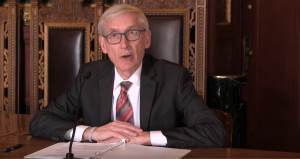Evers extends Safer at Home
April 16, 2020
Today Gov. Tony Evers directed Department of Health Services Secretary-designee Andrea Palm to extend the Safer at Home order to May 26, and amended the order to open up select parts of the economy.

In a press release, Evers said the outlook for Wisconsin was grim, but because of Safer at Home the projections are improving.
“We aren’t out of the woods just yet,” Evers said. “As I’ve said all along, we are going to rely on the science and public health experts to guide us through this challenge.”
He asked residents to continue social distancing to ensure the safety of all Wisconsinites.
In the release, Palm said testing needs to step up and more public health measures need to be in place before Safer at Home is lifted.
“These steps will help us reduce the risk of a second wave of the virus,” she said. “If we open up too soon, we risk overwhelming our hospitals and requiring more drastic physical distancing measures again.”
The extension of the Safer at Home order includes changes to allow more businesses and activities to open back up and make businesses safer for employees and customers.
Under the order, public libraries can provide curb-side pick-up of books and other library materials, golf courses can open again if scheduling and paying for tee times is done online or by phone, non-essential businesses can take part in “minimum basic operations,” and arts and craft stores can offer curb-side pick-up of materials necessary to make face masks or other personal protective equipment.
The order also established safe business practices for essential businesses, which include increased cleaning and disinfection, ensure that only necessary workers are present, and adopt policies to prevent workers exposed to COVID-19 or symptomatic workers from coming to work.
Retail stores that remain open to the public must limit the number of people in the store at one time, provide proper spacing for people waiting to enter and large stores must offer two hours per week for vulnerable populations.
Companies that supply, manufacture, or distribute goods and services to other essential businesses can only continue operations that are necessary to those businesses. All other operations must continue as Minimum Basic Operations.
Evers also closed public and private K-12 schools for the remainder of the school year, and gave local health officials the go-ahead to close parks if it becomes difficult to ensure social distancing or if the parks are being mistreated.













